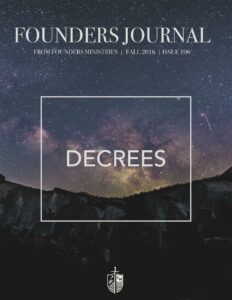The Perfect Confluence of God’s Providence and Human Freedom
John Wesley, the great revivalist preacher and founder of Methodism, objected in no uncertain terms to a Reformed understanding of God’s eternal decrees and providence. In his Thoughts Upon Necessity, Wesley reproached the views expressed by the Westminster Divines and their understanding of a God whose decrees as fixed and immutable, and whose providence carrying out those decrees extends to the smallest, seemingly-insignificant areas of everyday life to matters concerning men’s actions and eternal states. Although he referred to the Reformed view as “an exceeding ancient opinion,” Wesley was not thereby suggesting its legitimacy. Just as Adam had blamed his sin on Eve and she had likewise credited her sin to the serpent, imputing one’s actions to another is as old as humanity itself, says Wesley: “It is true, I did eat, but the cause of my eating, the spring of my action, was in another.”1 For Wesley, such erroneous thinking persisted from the fall to the Stoics, the Manicheans and eventually to the Calvinists of his day.2
Like the Westminster Confession after which it was modeled, Chapter III of the Second London Confession also provides a strong affirmation on God’s eternal decrees: “GOD hath Decreed in Himself from all Eternity, by the most wise and holy Counsel of his own will, freely and unchangeably, all things whatsoever comes to pass.”3 Questions undoubtedly arise from this statement, and its authors anticipated possible objections with further clarifying remarks:
Yet so as thereby is God neither the author of sin, nor hath fellowship with any therein, nor is violence offered to the will of the Creature, nor yet is the liberty, or contingency of second causes taken away, but rather established, in which appears his wisdom in disposing all things, and power, and faithfulness in accomplishing his decree.4
The statement addresses several interrelated questions that challenge its understanding of God’s decrees and providence. In particular, this article will explore what the confession affirms about the relationship between God’s providence and human freedom. The Reformed position found in the Second London Baptist Confession—particularly as it addresses God’s sovereignty and human responsibility—stands up to common objections often levelled against it by critics. More importantly, however, this article will contend that the pages of Scripture confirm the Reformed position on these issues.
Wesley articulated his objection to the Reformed doctrine of providence, which for him negates any grounds for either blame or praise:
If all the passions, the tempers, the actions, of men are wholly independent on their own choice, are governed by a principle exterior to themselves, then there can be no moral good or evil. There can be neither virtue nor vice, neither good nor bad actions, neither good nor bad passions or tempers … if all the passions and tempers of men are quite independent on their own choice, are governed by a principle exterior to themselves, then none of them is either rewardable or punishable, is either praise- or blame-worthy. The consequence is undeniable.5
Thus according to Wesley, the Reformed view provides little room for free agency. Given the Reformed position, “man can no more help sinning than a stone can help falling.”6 Prior to Wesley, seventeenth-century General Baptist Thomas Grantham offered a similar critique in his Christianismus Primitivus:
When we say, that nothing comes to pass without God’s providence. We do not mean (as some) That God hath eternally determined, and that unalterably, all things to be that have been, and that all things are determined by him which are; and that all things shall be, which shall be. For who dare once imagine that God would unchangeably decree, or decree at all? The manifold Acts of Villany that have been, are, and will yet be done in the World: this must unavoidly make him the Author of Sin, and Men, and Devils, the Executors only of his Decrees, which God forbid.7
For Grantham, the Reformed position does allow for blame, but the blame is ultimately placed on God as the author of sin.
Despite these challenges, Reformed theologians have maintained the reality of God’s decrees, providence and human freedom and pointed to numerous passages in Scripture to defend their position. In his work The Cause of God and Truth, eighteenth-century Particular Baptist John Gill affirmed the Reformed view in part by appealing to Psalm 33:13–15 and Proverbs 21:1. Gill wrote:
Much of the providence of God lies in the government of men, in moving of their wills, and ordering of their actions, to bring about his great designs and his own glory. For, as he has made all things for himself, for his own glory, so he orders and disposes all things to answer to that end. … And as he made and fashioned the hearts of all men, it is as certain that the hearts of all men are under his government, he can move, influence, and determine them to this and the other action at his pleasure without offering any violence to them.8
For Gill, denying God’s government over the hearts of men would thereby shut out God’s control “in the most considerable affairs and events of this lower world.”9 On the contrary, Gill argued that God governed both the good and sinful actions of men, but in a way that does not injure the freedom of the individual. On this point, Gill merely reflected what the Second London Confession stated in its chapter on divine providence:
[God’s] determinate Counsel extendeth itself even to the first fall, and all other sinful actions both of angels, and Men; (and not by bare permission) which also he most wisely and otherwise ordereth, and governeth, in a manifold dispensation to his most holy ends: yet so, as the sinfulness of their acts proceedeth only from the Creatures, and not from God; who being most holy and righteous, neither is nor can be, the author or approver of sin.10
In order to reconcile God’s eternal decrees, providence and man’s freedom, Gill suggested that God simply acts in accordance with our own desires, whether for good or for evil. When God desires to influence men towards the good, wrote Gill, He “puts his own grace and goodness into them, or stirs up and excites what he had put there before.”11 Conversely, when God moves men to evil actions He does not do so by putting sinfulness into men or assist them in sinning; if that were the case, the Arminians could make a genuine charge that the Reformed position makes God the author of sin. Nevertheless, God does leave men to the desires of their own hearts: “[God] only leaves them to the sinfulness he finds, and moves the natural faculty of the will to these actions, not as sinful, but as natural.”12 In his Abstract of Systematic Theology, James Petigru Boyce mirrored Gill’s conclusions:
[God’s providence] does not forbid the use of inducements to any specific action, nor the placing of man in circumstances which would influence, or control his acts. … But, wherever they are only persuasive, so as to lead him to delight in or to choose a specific course of action, through his own good pleasure, liberty is preserved, and man is responsible for his choice.13
Thus, in His providence God may use various means to incline men towards one desired action or another, but in the end the choices are truly theirs and result from following the strongest inclinations of their hearts.
Numerous passages in Scripture bear witness to this truth. The prophet Isaiah revealed that God raised up the Assyrians against the Israelites as a means to punish the wickedness of His people:
Ah Assyria, the rod of my anger; the staff in their hands is my fury! Against a godless nation I send them, and against the people of my wrath I command him, to take spoil and seize plunder, and to tread them down like the mire of the streets.14
Although the king of Assyria attributed his conquest to his own strength and wisdom, Isaiah reminds his readers that God orchestrated the events and that the king was a mere means to an end: “Shall the axe boast over him who hews with it, or the saw magnify itself against him who wield it? As if a rod should wield him who lifts, it, or as if a staff should lift him who is not wood!”15 Even more startling than this revelation is that God intended to judge the very instrument He appointed to carry out His will: “When the Lord has finished all his work on Mount Zion and on Jerusalem, he will punish the speech of the arrogant heart of the king of Assyria and the boastful look in his eyes.”16 Therefore, says theologian Bruce Ware:
The free and responsible actions of the Assyrians, as shown by their arrogant hearts conceiving and carrying out exactly what they most wanted to do, is fully compatible with God’s determination to raise up Assyria, commanding and sending them to do exactly what God willed that they do.17
Similarly, Gill appealed to Revelation 17:17 to further demonstrate the congruity between God’s sovereignty and man’s responsibility. Although the kings freely hand over their kingdoms to the beast, God is the one who has “put it in their hearts to carry out his purpose.”18 In his commentary on Revelation, Gill reiterated that God did not steer their hearts by infusing sin into them, but by “giving them up to their own hearts’ lusts; stirring up, and moving upon their minds, and directing the motions of it, to such and such objects, which they readily and voluntarily fell in with.”19
Two other important passage in Scripture provide an examples of the reality of both God’s sovereignty and man’s freedom. In his Body of Doctrinal and Practical Divinity, Gill not only asserted that God, in His perfect knowledge, foresaw the fall of Adam in Genesis 3, He also predetermined it since God’s foreknowledge of the future “flows from the determinations of his will.”20 Nevertheless, wrote Gill: “[God] did not force or impel either Satan to tempt, or man to sin; they both acted their part freely, without any force or compulsion.”21 Satan acted out of his own spite, malice and envy, and, said Gill, “none of Adam’s sons and daughters ever ate a heartier meal, and with more good will, or with greater gust, than our first parents ate the forbidden fruit.”22
Furthermore, Gill determined that the necessary corollary to Adam’s fall was God’s predetermined plan of redemption. Speaking to his Israelite brethren in Acts 2:23, Peter notes that “this Jesus, delivered up according to the definite plan and foreknowledge of God, you crucified and killed by the hands of lawless men.” Later on, the believers in Jerusalem elaborate further on God’s sovereign plan:
For truly in this city there were gathered together against your holy servant Jesus, whom you anointed, both Herod and Pontius Pilate, along with the Gentiles and the peoples of Israel, to do whatever your hand and your plan had predestined to take place.23
God did not merely permit the crucifixion, but, as Luke makes clear, God foreordained the very means by which this would take place. Commenting on this passage, Gill reaffirmed that the wicked men freely chose to betray and crucify Christ:
It was not their intention and design, to fulfill the purposes and decrees of God, but to fulfill their own lusts, and satiate their rage and malice against him … what they wickedly did, God designed for good, and hereby brought about the redemption and salvation of his people.24
Like the Assyrian king, those involved in Christ’s crucifixion were not absolved from responsibility because they were instruments in carrying out God’s decree; the designation “lawless men” bears witness to their guilt. The wicked men acted freely in carrying out their plot against Christ, yet through their free actions God was accomplishing His plan to redeem His people.
Importantly, as Ware notes, God’s providence works no less towards good ends, and God’s gracious works in the lives of His elect especially demonstrated this:
Here is the marvel and miracle of God’s gracious effectual calling and the new birth. Whereas before we were born again, our highest inclinations were always, in one form or another, to turn from God and reject the gospel of Christ and the renewing work of the Spirit, God brings about in His elect a new heart and manifests a new strongest inclination and deepest desire to turn from sin to the very Christ we formerly despised.25
God’s effectual calling and the Spirit’s work of regeneration do not act by means of compulsion, but rather they direct men’s affections towards the Savior. Additionally, God’s providence also extends to those means which preserve the believer. In a sermon on Philippians 2:12–13, Basil Manly Sr. discussed the relationship between God’s action and man’s responsibility. Paul informs believers to “work out your own salvation with fear and trembling, for it is God who works in you for his good pleasure.” Manly noted that while “it is the power of God which quickens, which implants the life,” men must also work out their salvation “by cultivating the principle of grace, and conducting it through all the different stages of growth and Christian experience.”26 Of course, one of the most important means by which God accomplishes His ends is through the proclamation of the gospel. Errol Hulse warns against neglecting God’s means:
There is the most obvious danger of all which is to make the wrong conclusion that since grace is sovereignly given then we can leave it all to God and relax. The truth is that grace is given through human means. It is most significant that the truth of Romans which stresses the necessity of preaching the Gospel is found between the ninth and eleventh chapters which declare God’s omnipotent sovereignty. Paul and the master he served both declared the sovereignty of God. Neither neglected the necessity of hard work and the maximum use of the means of grace by which sovereign grace comes to men.27
Conclusion
Although the foregoing discussion on God’s decrees and providence is an important one, it can easily overshadow what the confession further concludes from the doctrines, namely, that they declare God’s infinite wisdom, power and faithfulness. In other words, affirmations about God’s works directs us towards affirmations about His character. Gill remarked that “[God’s] decrees are laid in the deepest wisdom; which, though unsearchable by us, and may be unaccountable to us; yet there is, as the apostle expresses it, speaking of them, ‘a depth of the riches, both of the wisdom and knowledge of God in them.’”28 Likewise, nineteenth-century Baptist theologian J. L. Dagg echoed Gill:
The purpose of God is infinitely wise. … God must have a purpose because he is wise; and, therefore, his wisdom must be concerned in his purpose. It is not an arbitrary or capricious scheme; but one devised by infinite wisdom, having the best possible end to accomplish, and adopting the best possible means for its accomplishment.29
Far from being fatalistic, the Reformed understanding of God’s decrees and providence reveals the great care God has for His creation and that nothing—even the greatest of tribulations—are outside of God’s all-wise plans and control. Consequently, believers can trust that “for those who love God all things work together for good, for those called according to his purpose.”30 Furthermore, believers can have confidence that God’s appointed means, whether for salvation, sanctification or evangelism and missions, will successfully accomplish His desired ends, namely, that “those whom he predestined he also called, and those whom he called he also justified, and those whom he justified he also glorified.”31 The great truths expressed in the Second London Confession comforted Baptists facing persecution at the time of its writing, and should offer no less encouragement for Baptists over three hundred years later when the media reports daily of immeasurable calamity, wickedness and the rise and fall of nations. For the godly man, noted Calvin, “His solace … is to know that his Heavenly Father so holds all things in his power, so rules by his authority and will, so governs by his wisdom, that nothing can befall except he determine it.”32 The Second London Confession reminds us that an all-wise, all-powerful God is directing all things towards His appointed ends, and as such the confession remains an invaluable expression of the perfect confluence of divine decrees, providence and choices of the human will.
1 John Wesley, Thoughts Upon Necessity, in John Wesley, ed. Albert Outler (New York, NY: Oxford University Press, 1964), 479.
2 Wesley, Thoughts Upon Necessity, 479–480.
3 William L. Lumpkin and Bill J. Leonard, Baptist Confessions of Faith, 2nd revised ed. (Valley Forge, PA: Judson Press, 2011), 238.
4 Lumpkin, Baptist Confessions, 238.
5 Wesley, Thoughts Upon Necessity, 480–481.
6 Wesley, Thoughts Upon Necessity, 480.
7 Thomas Grantham, Christianismus Primitivus (London: Francis Smith, 1678), 51–52.
8 John Gill, The Cause of God and Truth (London: W. H. Collingridge, 1185; reprint ed., Grand Rapids, MI: Baker Book House, 1980), 205.
9 Gill, The Cause of God and Truth, 205.
10 Lumpkin, Baptist Confessions, 242.
11 Gill, The Cause of God and Truth, 205.
12 Gill, The Cause of God and Truth, 206.
13 James P. Boyce, Abstract of Systematic Theology (Cape Coral, FL: Founders Press, 2006), 224.
14 Isaiah 10:5–6 (ESV). All Scripture quotations are taken from the ESV.
15 Isaiah 10:15.
16 Isaiah 10:12.
17 Bruce Ware, “The Compatibility of Determinism and Human Freedom,” in Whomever He Wills: A Surprising Display of Sovereign Mercy, ed. Matthew Barret and Tom Nettles (Cape Coral, FL: Founders Press, 2012), 217.
18 Revelation 17:17.
19 John Gill, Exposition of the Old and New Testaments, 9 vols. (Paris, AR: The Baptist Standard Bearer, 1989), 9:828.
20 John Gill, A Complete Body of Doctrinal and Practical Divinity, 2 vols. (London: Printed for W. Winterbotham, 1796), 1:465.
21 Gill, Body of Divinity, 464.
22 Ibid.
23 Acts 4:27–28.
24 John Gill, Exposition of the Old and New Testaments, 8:176.
25 Ware, “The Compatibility of Determinism and Human Freedom,” 229.
26 Basil Manly Sr., in Southern Baptist Sermons on Sovereignty and Responsibility, ed. Tom Nettles (Harrisonburg, VA: Gano Books, 1984), 9.
27 Errol Hulse, The Believer’s Experience: Maintaining the Scriptural Balance Between Experience and Truth (Grand Rapids, MI: Zondervan, 1980), 54.
28 Gill, Body of Divinity, 256; c.f. Romans 11:33.
29 Dagg, Manual of Theology, 103.
30 Romans 8:28.
31 Romans 8:29.
32 John Calvin, Institutes of the Christian Religion, 2 vols., ed. John T. McNeil and trans. Ford Lewis Battles (Philadelphia, PA: Westminster Press, 1967), 1:224.






















